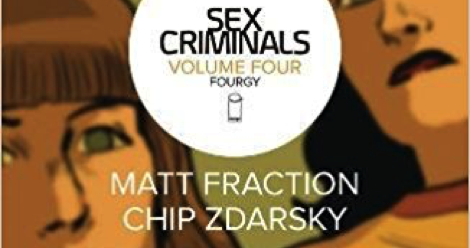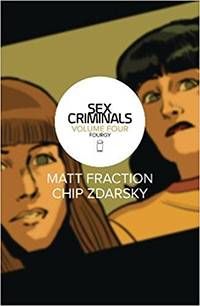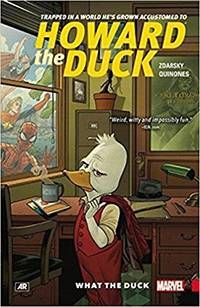
Let’s Talk About SEX (CRIMINALS): An Interview with Matt Fraction and Chip Zdarsky

I recently had the pleasure (pun intended) of talking to Fraction and Zdarsky about their series.
Book Riot: One of the things I love most about reading the single, “floppy” issues of the series is the letters column [which aren’t collected in the volumes]. I love reading about how positively a comic book about people having sex and orgasming in order to rob banks has affected not only readers’ sex lives, but their emotional lives as well. What would you say is the most common bit of “thanks” you receive? Why do you think the series elicits that reaction?
Matt Fraction: From my perspective, I think the book speaks to the feeling of being alone and being unique and being unlovable and unfuckable, unwantable and undesired—everyone’s suspicion that, deep down, you’re a weird monster that no one’s going to get. I think regardless of what makes you feel that way, it’s a journey we all share and a feeling we all share. We all feel that otherness together, which is, in effect, togetherness. So I think more than anything, the thing I hear all the time, the thing I’m most gratified to hear, that I have heard with frequency is, “I thought I was the only one” or “I thought I was alone.” We even met someone at a show last weekend who said they’d never heard the word asexual before and they said, “Oh that’s me.” Or was that Jughead?
Chip Zdarsky: That was Jughead. I mean, it works just as well for Sex Criminals. One of the things I never quite know how to feel about is when readers say they start dating someone because of a shared appreciation of the book. That could either go very well or very wrong.
MF: I like the idea of it getting people laid.
CZ: Oh I love that.

CZ: It’s interesting because I’m doing it in reverse order from that. My first comics work was just me and then it was working with Matt, so I had to learn how to work with somebody. Then, I entered the Marvel machine, where you’re working with a ton of other people; there’s so many considerations and at the end of the day, you don’t own the characters, you’re kind of inheriting them and you’re going to pass them on to somebody else. There’s still an emotional connection to the work, but it makes me appreciate Sex Criminals even more because it’s such a pure thing. There are no intermediaries—it’s just Matt and I. We don’t even have colorists or inkers.
MF: The crazy thing about with working with Betty Breitweiser [the colorist on issue #17] was that there was another set of hands on the book. It was strange.
CZ: Yes, strange. So the Marvel stuff has made me appreciate our book even more. That’s not to be disparaging against Marvel, it’s just a very different setup and experience.
BR: Sort of like monogamy versus polyamory.
MF: (laughs) Yeah, exactly. I keep screwing up and calling characters Peter Parker and Thor. Chip has to fix all that in lettering. I loved my time working at Marvel. It was a blast to get to play with these toys that I’ve looked at since I was a kid. I think a thing that helped me there was that I never stopped doing my own stuff. I was always good at understanding about talking about certain things: “This would work for Thor, this would not work for Thor.” Like, “This is an Iron Man story, you can’t do cum jokes in Iron Man.”
CZ: Challenge accepted!
MF: I think I was good at differentiating. There’s a story I like to tell about Alan Moore when he quit Swamp Thing. Someone asked him, “How could you quit, you’re so good!” And he said, “I wanted to tell stories about the environment and the big muck monster kept getting in the way.” Which is like, a great time to leave Swamp Thing. So that’s really the thing, feeling like, “Oh I can do this story, I can do that story.” And because Sex Criminals is just me and Chip, this thing that we’ve built from the ground up—we can stop and have the bad guys take over for an issue. It scratches a different itch.
BR: A lot of the things that Jon says in Sex Criminals—the voice—is similar to your take on Danny Rand or Hawkeye. Do you find that working on those books helped refine that voice maybe?
MF: Oh, no, I just think I’m a hack. I think it’s style. Like, in a perfect world, I would obliterate all traces of it.
CZ: I think about that a lot. People buy either a Matt Fraction book or a Zdarsky book for the style, for the voice. If you stripped all the style of it, it would feel generic. All of my favorite authors have that specific voice and sometimes their characters across novels would feel similar, but I never thought about it as a bad thing.
BR: Do you find that the things you’ve done with Sex Criminals have sort of given you a voice that you tap into for your non-creator-owned works?
CZ: Probably a little less so because I’m not writing Sex Criminals. It has afforded me the opportunity, for sure. The editor who brought me into Marvel, Will Moss, remembers me from an old comic I did called Monster Cops.
MF: What was it about?
CZ: (laughs) Sex. Just like everything. (both laugh)
BR: How much of the series do you have planned and how much of the series is just you two winging it, like, “Wouldn’t it be cool if we did this?”
MF: My go-to metaphor would be if you were going to take a road trip without a map. I live in Portland, Oregon and if I decided to drive to Chicago, if I got to the ocean, I would realize I was going the wrong way. If I got to the Canadian border, I would also have gone the wrong way. If, in a couple days time, I don’t cross the Mississippi, I’ve gone the wrong way. We have landmarks, but there’s still enough room in between for diversions. And we can decide, “Hey, we’re going to talk about Kegelface’s story, where she came from and why, we’re just going to do that here.” We didn’t know from the beginning that issue 18 or whatever it was we would do a Criminal pastiche that’s all about the bad guys. We knew it was a place where we wanted to get to, we just weren’t sure how to get there. We know Portland, we know Chicago, and we know the major landmarks in between.
CZ: The closer we get to the end, the more planned out it becomes. You recognize that characters need resolution. We’ve been playing with the pieces this whole time and now we have to put those pieces into position in order to have stakes.
BR: Do you see the separate volumes as stories in and of themselves or just as chapters in a longer, less structured story?
MF: It has to work as a complete thing and it has to work as individual volumes and it has to work as individual chapters, but then it has to work as individual pages and individual panels. It’s a case of each having to function on its own but it’s silly to think that it doesn’t relate to other pieces. I always feel like the start of an arc is a chance to get people up to speed. Like we did the Marvel Saga gag with like, a six-page recap. There’s always a chance to invite people on board. Someone might be picking this up in a bookstore and so maybe try to find a way into the story that doesn’t insult everyone’s intelligence that’s read it the whole time but is also accommodating to someone new. The first episode of Buffy I ever saw was the one where they go to the dark universe or whatever, which is a terrible first episode to see because it’s entirely predicated on how different it is and I had no clue. It’s always in the back of my head: don’t throw someone into the tall grass right away.
CZ: I started with the movie because I’m a purist.
BR: So what would say is the story of “Fourgy”? If each volume is its own thing, then what is this one?
MF: Well, the gang is all together. The reference to a group in the title isn’t entirely just to make a play on the number four. Sides are being drawn and everyone’s kind of bouncing off of each other and relating to one another. All the pieces are on the chess board and now they’re interacting. Everyone’s all together now, but they all got feelings and so stuff is different. We got where we wanted to go, but not in a way that any of the characters would have anticipated or expected. We’re dealing with the consequences of everyone’s world getting bigger and stranger.
CZ: The drawings are the same.
MF: (laughs) But that’s not true! Not only have you gotten better, just by work and repetition, but your acting is so skillful. If you’ve been reading from the beginning it registers like, “Oh, this isn’t a smile.” It’s not just sophistication of skill, but there’s a depth and richness that we weren’t able to get at right away because everyone was new.
CZ: Aw, you’re sweet. I’ve definitely gotten more consistent. Issue one is all over the map, probably because I was getting used to drawing it all digital too. But yeah, I’m trying. I’m trying!
BR: It’s just about learning the characters. If you’re learning who the characters are narratively, it’s not too much of a stretch to say that you’re learning to know them physically.
CZ: Yeah. You know, most of the characters are based on real people or friends. I like working with real models because they’ll do things and act in a way that I wouldn’t be able to generate on my own, but then whatever the story dictates I’ll do something different and new. It’s a weird process.
BR: One thing that stood out for me while reading this new arc was the spotlight trained on the female experience—Suzy has always been our protagonist (or at least one of them, and the more prominent one at that), but in these recent issues there’s the focus on Myrtle and the focus on Jazmine. I really liked the sequence that shows her putting on makeup—the layout, and the sheer business of the page really delineates how much effort goes into preparations like that.
MF: And the guy [in that sequence] basically makes sure there’s not a lot of mustard stains on his shirt.
BR: How were you able to channel that femininity or access it?
MF: I think it’s empathy. I’m totally unafraid to impose on the women in my life for their perspective. I made a huge list and talked to Kelly Sue [DeConnick], my wife, and Kit Cox, our assistant, and Lauren Sankovitch, our editor, and we all worked together to make sure the sequence was right. It’s easy for me to imagine all the different steps than it is for me to imagine what the order is. All the book is an act of empathy and it’s a lot of work and these people spend a lot of time in my head and I have to like them, or at least something about them, and it just starts from there.
CZ: And then you make me draw 64 panels of a woman getting ready.
MF: But the page after that was only two panels! That averages out to 33 panels a page, chum.
CZ: You’re so good to me.













